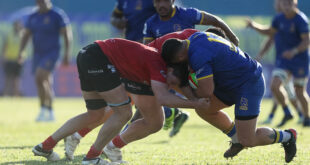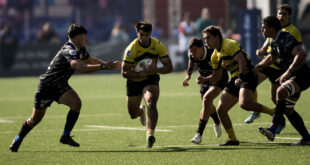Rugby World Cup 2015, like previous tournaments will bring together teams who otherwise never play against one another. World Champions New Zealand will face both Georgia and Namibia for the first time, South Africa vs Japan will be another first as will Wales vs Uruguay.
There are a variety of reasons for such fixtures being a first. They range from unfavorable geography, to a full calendar to marketability. Above all else a genuine lack of interest from those who run the game is the central reason. This, however, need not continue any longer with changing financial markets opening new opportunities.
Back in 2013 Australia hosted the British and Irish Lions while New Zealand hosted France which left South Africa without a Tier One side at full strength to host in June. The union acted to make the most out of an unfavorable situation and hosted Italy, Samoa and Scotland in an international series in which all four countries faced one-another in South Africa.
The tournament was, in effect, a mini-Confederations Cup as taking part were four countries from three continents. Matches were played exclusively on weekends and with adjustments made to begin slightly earlier and finish one weekend later the tournament model would be able to be applied on a larger scale.
Qualifying from other regions were Japan, Mexico, Nigeria, Tahiti and Uruguay. Based on performances at the 2014 FIFA World Cup the allocation of positions is of extreme note. Italy, Japan and Spain were all eliminated in the first phase while Mexico, Nigeria and Uruguay exited at the round of sixteen. As such Brazil was the only 2013 Confederations Cup competitor involved in the Quarter Finals of the 2014 FIFA World Cup. Tahiti did not compete and Oceania is not given an automatic spot which has seen Australia competing in Asia.
In regional terms an argument could be made to suggest that a Confederations Rugby Cup would be more competitive than that of the soccer variety. In the eighty-four year history of the FIFA World Cup all winners have been either South American or European. The Rugby World Cup, on the other hand had winners from Africa, Europe and Oceania in its first twenty-four years.
The six regional bodies of rugby, as recognized by World Rugby could therefore have their champions all qualify for a Confederations Rugby Cup taking place during either the June or November internationals in the year before the Rugby World Cup. As in soccer they could be joined by the host of the next World Cup and the winners of the previous tournament.
Work would be required from World Rugby and the regional bodies to enable a qualification process to have all participants earn their places in the tournament. This would be true even of South Africa and Argentina, countries with no genuine challengers in their regions. The method utilized in the 2014 South American Championship would be a suitable solution for Africa with the top two sides from the African Cup advancing to play in an African version of the CONSUR Cup.
This would also enable matches such as the All Blacks playing in Samoa to be repeated. Indeed the creation of an Oceania Cup would give meaning to such fixtures and enable the winner of the southern section of the Pacific Nations Cup to face Australia and New Zealand in a Tri-Series with the winner qualifying for the Confederations Cup.
In Europe the winner of the European Nations Cup (ENC) ought to dispute Europe’s allocated position by playing against the top two sides from the Six Nations. In other words Georgia would be able to host an opponent such as England, France, Ireland or Wales. The same would hold true in North America and the Caribbean with Canada and the USA facing the winner of a NACRA Cup while in Asia the top three could be joined by a repechage winner.
Finding room in the rugby calendar for these fixtures would arguably be a more than negotiable task. Sudamérica Rugby, ARFU and NACRA would need no extra time and nor would CAR as South Africa could replicate Argentina by fielding below-strength teams and still be too strong. FORU would require two weekends for the winner, Fiji for instance, to play both Australia and New Zealand while the Bledisloe Cup match could double as qualification. Options exist in June and July. The European Champion could play two matches in August ahead of the kick-off to the European professional season with the Six Nations match also doubling.
| Team | Region | Qualification Method |
| England | Europe | 2015 World Cup hosts |
| New Zealand | Oceania (FORU) | 2011 World Cup Winners |
| Ireland | Europe | European Cup* Winners |
| Argentina | South America (Sudamérica) | CONSUR Cup Winners |
| Canada | North America (NACRA) | NACRA Cup* Winners |
| Japan | Asia (ARFU) | Asian Championship Winners |
| Australia | Oceania (FORU) | Oceania Cup* Runners-Up |
| South Africa | Africa (CAR) | Africa Cup* Winners |
Dividing teams into pools could be organized according to World Rankings with no teams from the same region being pooled together. The opportunity of Australia facing New Zealand would therefore not exist until either the Semi Final or Final. Dividing the teams into two pools would mean three matches each, the exact format used by FIFA. The winners and runners-up would qualify for the Semi Finals.
Pool A – South Africa, Ireland, Australia, Japan
Pool B – New Zealand, England, Argentina, USA
A Rugby Confederations Cup could have been played in November 2014 in England. Those from outside of Europe not involved could, in theory, play November internationals in Europe against European nations outside of the tournament. Based on the above model Ireland and England would miss out thus enabling France, Italy, Scotland and Wales to host incoming tours against the likes of Rugby World Cup regulars Fiji, Samoa, Tonga and Canada. Ireland could be compensated by World Rugby for missing out on hosting tests at this time.
The event would facilitate the promotion of the Rugby World Cup by encouraging the population to attend noteworthy matches at a variety of venues eleven months before the World Cup. In the specific case of England the organizing committee could have acquired the use of 2015 venues. As a matter of fact from November 9-21 there were no Premier League soccer matches.
| Date | Match | Venue |
| Friday October 31 | England vs New Zealand | Twickenham |
| Saturday November 1 | Australia vs Japan | Brighton |
| Saturday November 1 | Argentina vs USA | Gloucester |
| Sunday November 2 | South Africa vs Ireland | Twickenham |
| Thursday November 6 | England vs USA | Leicester |
| Friday November 7 | New Zealand vs Argentina | Leicester |
| Saturday November 8 | Australia vs Ireland | Milton Keynes |
| Sunday November 9 | South Africa vs Japan | Leeds |
| Friday November 14 | New Zealand vs USA | Birmingham |
| Saturday November 15 | Australia vs South Africa | Leeds |
| Saturday November 15 | Ireland vs Japan | Newcastle |
| Sunday November 16 | England vs Argentina | Manchester |
| Saturday November 22 | Winner A vs Runner-up B | Twickenham |
| Sunday November 23 | Winner B vs Runner-up A | Twickenham |
| Saturday November 29 | Winner SF 1 vs Winner SF 2 | Twickenham |
 Americas Rugby News Rugby news from across the Americas!
Americas Rugby News Rugby news from across the Americas!




